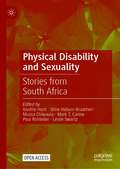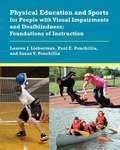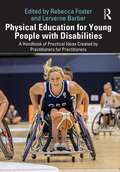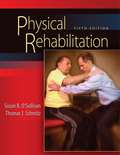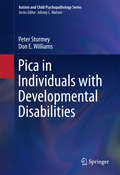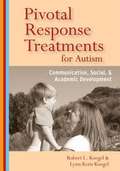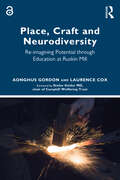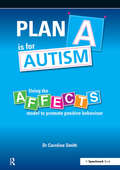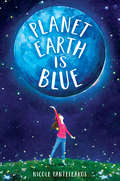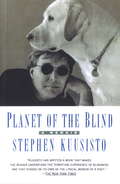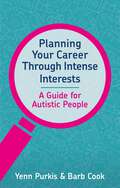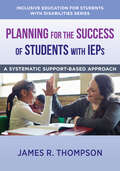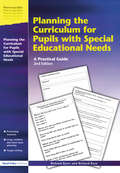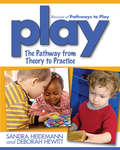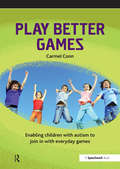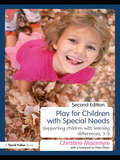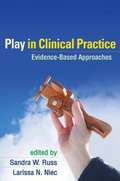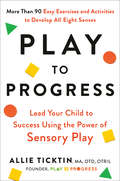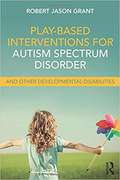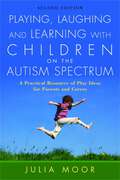- Table View
- List View
Physical Disability and Sexuality: Stories from South Africa
by Leslie Swartz Poul Rohleder Xanthe Hunt Stine Hellum Braathen Mussa Chiwaula Mark T. CarewThis open access edited volume explores physical disability and sexuality in South Africa, drawing on past studies, new research conducted by the editors, and first-person narratives from people with physical disabilities in the country. Sexuality has long been a site of oppression and discrimination for people with disabilities based on myths and misconceptions, and this book explores how these play out for people with physical disabilities in the South African setting. One myth with which the book is centrally concerned, is that people with disabilities are unable to have sex, or are seen as lacking sexuality by society at large. Societal understandings of masculinity, femininity, bodies and attractiveness, often lead people with physical disabilities to be seen as being undesirable romantic or sexual partners. The contributions in this volume explore how these prevailing social conditions impact on the access to sexual and reproductive healthcare, involvement in romantic relationships, childbearing, and sexual citizenship as a whole, of people with physical disabilities in the Western Cape of the country. The authors' research, and first person contributions by people with physical disabilities themselves, suggest that education and public health policy must change, if the sexual and reproductive health rights and full inclusion of people with disabilities are to be achieved.
Physical Education and Sports for People with Visual Impairments and Deafblindness
by Lauren J. Lieberman Paul E. Ponchillia Susan V. PonchilliaPhysical education teachers, adapted physical education teachers, and activity leaders in the trenches are always on the lookout for new, appropriate, and appealing games and activities for their students. When it comes to working with individuals who are visually impaired or deafblind, however, most of them confront what may seem like a greater challenge: how to in¬clude these students in physical activities and adapt activities so that they may participate fully along with others. In Physical Education and Sports for People with Visual Impairments and Deafblindness: Foundations of Instruction, Lauren Lieberman, Paul Ponchillia, and Susan Ponchillia contribute compelling resources for these efforts and for these professionals, as well as for recreational therapists, physical therapists, teachers of students with visual impairments or deafblindness, and anyone concerned with the full inclusion of children and adults who are visually impaired in athletics and the other essential activities of life.
Physical Education for Young People with Disabilities: A Handbook of Practical Ideas Created by Practitioners for Practitioners
by Rebecca Foster Lerverne BarberPhysical Education for Young People with Disabilities explores a range of methods that will support teachers to be more inclusive in their practice when planning and teaching Physical Education. Offering many practical ideas to include pupils with specific additional needs across a range of activity areas, such as athletics, dance, gymnastics and swimming, this book will increase practitioners' confidence, enabling them to feel equipped to meet individual needs and include all pupils in their lessons. The range of authors provides a wide perspective and wealth of experience, and all the ideas have been trialled with students and young people, both nationally and internationally.Written by practitioners for practitioners, this book is a valuable resource for trainee teachers, in-service teachers and practitioners working in a practical or sporting context with young people, and will support Physical Education lessons and physical activity sessions.
Physical Rehabilitation (5th Edition)
by Susan B. O'Sullivan Thomas J. SchmitzThe text is designed to provide a comprehensive approach to the rehabilitation management of adult patients and is intended to serve as a primary textbook for professional-level physical therapy students, and as an important resource for practicing therapists as well as for other rehabilitation professionals.
Piagetian Reasoning and the Blind
by Yvette HatwellThe book reports the results of a series of studies undertaken in the early 1960s on the cognitive development of children with congenital blindness.
Pica in Individuals with Developmental Disabilities
by Peter Sturmey Don E. WilliamsThis book provides a comprehensive overview of the clinical phenomenon of pica. It focuses specifically on the disorder as it presents in children, adolescents, and adults with autism spectrum disorder (ASD) and intellectual disabilities (ID). Initial chapters introduce current theories and definitions, followed by a more detailed examination of how developmental disabilities complicate diagnosis and intervention. The volume describes evidence-based and clinically sound approaches to the treatment and prevention of pica in school and adult clinical settings, ranging from behavioral treatment to function-based interventions. In addition, it discusses common diagnostic, client, and provider issues that result in pica remaining undetected among individuals with ASD and ID. Featured topics include: Definition of pica in accessible terms, differentiating between various forms of the disorder. Issues and practical methods of prevention and treatment of pica in developmentally disabled persons. Functional and behavioral assessment methods for pica in individuals with ASD and ID. A range of effective behavioral and nonbehavioral treatments for pica. Illustrative cases and service delivery challenges. Areas for future research and practice. Pica in Individuals with Developmental Disabilities is an invaluable resource for researchers, clinicians and other professionals, and graduate students in clinical child and school psychology, behavior analysis/therapy, and social work as well as child and adolescent psychiatry, pediatrics, family studies, and special education.
Picture Inclusion!: Snapshots of Successful Diverse Classrooms
by Whitney H. Rapp Katrina L. Arndt Susan M. HildenbrandPicture one guidebook that gives you the fundamentals of inclusion, proven practices for teaching everyone, and dozens of student profiles and sample lesson plans. That's what you'll get in Picture Inclusion!, your ultimate theory-to-practice guide to teaching every learner in a diverse inclusive classroom.
Pip and Bunny: Pip at Home (Supporting Language and Emotional Development in the Early Years through Reading)
by Maureen GlynnPip at Home is the sixth book in the invaluable ‘Pip and Bunny’ collection; a set of six picture books with an accompanying handbook and e-resources carefully written and illustrated to support the development of visual and literary skills. By inspiring conversation and imagination, the books promote emotional and social literacy in the young reader. Designed for use within the early years setting or at home, each story explores different areas of social and emotional development. The full set includes: six beautifully illustrated picture books with text and vocabulary for each a handbook designed to guide the adult in using the books effectively ‘Talking Points’ relating to the child’s own world ‘What’s the Word?’ picture pages to be photocopied, downloaded or printed for language development detailed suggestions as to how to link with other EYFS areas of learning. The set is designed to be used in both individual and group settings. It will be a valuable resource for teachers, SENCOs (pre-school and reception), Early Years Staff (nursery, preschool and reception), EOTAs, Educational Psychologists, Counsellors and Speech Therapists.
Pivotal Response Treatment For Autism: Communication, Social, And Academic Development
by Lynn Kern Koegel Robert L. KoegelDiscover how to use natural learning opportunities to target and modify key behaviors in children with autism, leading to widespread positive effects on communication, behavior, and social skills. It's all possible with the innovative, widely used Pivotal Response Treatment (PRT), an empirically supported treatment for autism recognized by the National Professional Development Center on Autism Spectrum Disorders and the National Standards Project. <p><p> Because PRT works with each child's natural motivations and stresses functional communication over rote learning, this comprehensive model helps children develop skills they can really use. With this timely resource, educators and therapists will support children with autism as they enjoy more positive interactions, more effective communication, and higher academic achievement in natural, inclusive settings.
Place, Craft and Neurodiversity: Re-imagining Potential through Education at Ruskin Mill
by Laurence Cox Aonghus GordonFor over four decades, Ruskin Mill Trust has worked with young people with special educational needs and behavioural issues who learn traditional crafts and organic farming as part of an integrated curriculum of therapeutic education, overcoming barriers to learning and re-engaging with the wider world. This accessible and inspiring book showcases how an appreciation of place, traditional crafts, farming and transformative education offers a wider route to human well-being for all. The authors outline the different fields of the “Practical Skills Therapeutic Education” method, which includes developing practical skills, learning the ecology of the farm and understanding therapeutic education, holistic care, health and self-leadership. Taking the reader on a tour of Ruskin Mill’s many extraordinary provisions across Britain, and going deeper in conversation with its founder, Aonghus Gordon, this book is an outstanding story of creative thinking in an age of narrow focus on classrooms and written examinations, presenting a transformative perspective on education and care. Being grounded in work supporting young people with complex additional needs, it provides a rare insight into the work of one of the world’s leading charities working with neurodiversity. With its non-specialist language, Place, Craft and Neurodiversity offers ideas and resources for work in different areas of education and therapy. It will inspire parents, educators and care workers around the globe.
Places I've Taken My Body: Essays
by Molly McCully BrownIndispensable essays on the body, mind, and spirit by Molly McCully Brown, author of the acclaimed poetry collection, The Virginia State Colony for Epileptics and Feebleminded, a book the New York Times described as “part history lesson, part séance, part ode to dread. It arrives as if clutching a spray of dead flowers. It is beautiful and devastating.” In seventeen intimate essays, poet Molly McCully Brown explores living within and beyond the limits of a body—in her case, one shaped since birth by cerebral palsy, a permanent and often painful movement disorder. In spite of—indeed, in response to—physical constraints, Brown leads a peripatetic life: the essays comprise a vivid travelogue set throughout the United States and Europe, ranging from the rural American South of her childhood to the cobblestoned streets of Bologna, Italy. Moving between these locales and others, Brown constellates the subjects that define her inside and out: a disabled and conspicuous body, a religious conversion, a missing twin, a life in poetry. As she does, she depicts vividly for us not only her own life but a striking array of sites and topics, among them Mary Shelley’s Frankenstein and the world’s oldest anatomical theater, the American Eugenics movement, and Jerry Falwell’s Liberty University. Throughout, Brown offers us the gift of her exquisite sentences, woven together in consideration, always, of what it means to be human—flawed, potent, feeling.
Plan A is for Autism: Using the Affects Model to Promote Positive Behaviour
by Caroline SmithThis text provides an original multi-element approach leading to planned individual interventions. Drawn from the author's extensive knowledge of autism it enables those living and working with children with Autism Spectrum Disorders (ASD) to jointly plan for change. This resource will: provide an overview of the behaviours of children with autism explore the underlying reasons why children with autism act and react as they do consider quite carefully who is impacted by the behaviour of the child with autism with what outcomes for emotional well-being explore how to make a difference in the shorter term by using the Keep It Simple (KIP) model help you to implement a unique and individual intervention plan for the child with autism using the AFFECTS plan
Planet Earth Is Blue
by Nicole Panteleakos<P><P>A heartrending and hopeful debut novel about a nonverbal girl and her passion for space exploration, for fans of See You in the Cosmos, Mockingbird, and The Thing About Jellyfish. <P><P>Twelve-year-old Nova is eagerly awaiting the launch of the space shuttle Challenger--it's the first time a teacher is going into space, and kids across America will watch the event on live TV in their classrooms. <P><P>Nova and her big sister, Bridget, share a love of astronomy and the space program. <P><P>They planned to watch the launch together. But Bridget has disappeared, and Nova is in a new foster home. While foster families and teachers dismiss Nova as severely autistic and nonverbal, Bridget understands how intelligent and special Nova is, and all that she can't express. <P><P>As the liftoff draws closer, Nova's new foster family and teachers begin to see her potential, and for the first time, she is making friends without Bridget. But every day, she's counting down to the launch, and to the moment when she'll see Bridget again. Because Bridget said, "No matter what, I'll be there. I promise."
Planet of the Blind
by Stephen Kuusisto<P> "The world is a surreal pageant," writes Stephen Kuusisto. "Ahead of me the shapes and colors suggest the sails of Tristan's ship or an elephant's ear floating in air, though in reality it is a middle-aged man in a London Fog rain coat which billows behind him in the April wind." <P>So begins Kuusisto's memoir, Planet of the Blind, a journey through the kaleidoscope geography of the partially-sighted, where everyday encounters become revelations, struggles, or simple triumphs. Not fully blind, not fully sighted, the author lives in what he describes as "the customs-house of the blind", a midway point between vision and blindness that makes possible his unique perception of the world. In this singular memoir, Kuusisto charts the years of a childhood spent behind bottle-lens glasses trying to pass as a normal boy, the depression that brought him from obesity to anorexia, the struggle through high school, college, first love, and sex. Ridiculed by his classmates, his parents in denial, here is the story of a man caught in a perilous world with no one to trust--until a devastating accident forces him to accept his own disability and place his confidence in the one relationship that can reconnect him to the world--the relationship with his guide dog, a golden Labrador retriever named Corky. With Corky at his side, Kuusisto is again awakened to his abilities, his voice as a writer and his own particular place in the world around him. <P> Written with all the emotional precision of poetry, Kuusisto's evocative memoir explores the painful irony of a visually sensitive individual--in love with reading, painting, and the everyday images of the natural world--faced with his gradual descent into blindness. Folded into his own experience is the rich folklore the phenomenon of blindness has inspired throughout history and legend.
Planning Your Career Through Intense Interests
by Barb Cook Yenn PurkisPlanning a career around your special or intense interests is possible and, in fact, easier than you might think! If you're wondering how you can turn your love of animals, intense fascination of transportation or passion for information technology (and much more!) into a fulfilling career, that you will never get bored of, you've come to the right place!Yenn Purkis and Barb Cook are leading autistic advocates, employees and business owners and are using their first-hand knowledge and the power of special interests to help you plan your future in this book. By straying from the conventional paths and thinking differently, Yenn and Barb could help take your passion for outer space and help transform you into a budding astronomer or even aerospace engineer!Full of helpful advice and activities, including goal and vision setting, identifying your skills and personality attributes, looking at what makes a positive workplace, common attributes of autistic employees and business owners and challenging assumptions to name just a few, this book will help you to find work that you truly enjoy and thrive in the workplace.
Planning for the Success of Students with IEPs: A Systematic, Supports-based Approach (Inclusive Education for Students with Disabilities #0)
by James R. ThompsonA great special educator is an expert problem-solver. The difficulties that students with individual education plans (IEPs) encounter in general education classrooms are rarely impossible to overcome. What is required to help them succeed is figuring out the individualized supports they need, whether that involves accessing technology, receiving assistance from a peer or adult, or curricular and assignment adaptations. In this comprehensive handbook from The Norton Series on Inclusive Education for Students with Disabilities, James R. Thompson synthesizes the work of a team of experts to provide a roadmap for that problem-solving process. The Systematic Supports Planning Process is structured around three central questions that lead to identifying different types of support: • “What to teach?”—curricular adaptations • “How to teach?”—instructional supports • “How to promote participation?”—participation supports Packed with easy-to-follow guidelines, as well as implementation tools and examples, this book is a one-stop reference for planning, delivering, monitoring, and evaluating the supports that students with IEPs require.
Planning the Curriculum for Pupils with Special Educational Needs: A Practical Guide (Resource Materials for Teachers)
by Richard Rose Richard ByersThis second edition is revised and updated to take full account of recent developments in special needs. The core of the book focuses on planning for well-differentiated curriculum implementation. It describes a variety of models that explore progression, continuity, relevance and inclusion for pupils with special educational needs. The authors also offer an analysis of curriculum management issues in the light of the theoretical and statutory background since the latest revisions of the National Curriculum and the Code of Practice.
Platypus and Fly: Targeting l Blends (Speech Bubbles 2)
by Melissa PalmerFly is sneaky and very cheeky. He likes to tease and annoy other creatures around him. Then he meets Platypus, who is ready for lunch. The race is on, but who will win? This picture book targets /l/ blends and is part of Speech Bubbles 2, a series of picture books that target specific speech sounds within the story. The series can be used for children receiving speech therapy, for children who have a speech sound delay/disorder, or simply as an activity for children’s speech sound development and/or phonological awareness. They are ideal for use by parents, teachers or caregivers. Bright pictures and a fun story create an engaging activity perfect for sound awareness. Picture books are sold individually, or in a pack. There are currently two packs available – Speech Bubbles 1 and Speech Bubbles 2. Please see further titles in the series for stories targeting other speech sounds.
Play
by Deborah Hewitt Sandra HeidemannPlay skills are life skills; as children develop them, they also learn important social skills that they will use throughout their lives. Teachers will find successful strategies for implementing changes in the classroom to enhance the environment for play and techniques to help support children's development. This is the revised edition of the well-respected and relied-upon handbook Pathways to Play. Play contains activity ideas that encourage play skills, checklists to help identify where children are having problems, specific teaching strategies, and assessment options. This new edition also examines how play theory translates into practice.
Play Better Games: Enabling Children with Autism to Join in with Everyday Games
by Carmel ConnOrdinary games are an important vehicle for children's learning. They provide a powerful, naturally occurring learning environment that is physical, playful and fun. Playing games requires interpersonal skills in language, thought, social behavior, creativity, self-regulation and skilful use of the body. When children play games together they develop the following key capacities:•Cooperative behavior•Focused attention•Social understanding•Holding information in mind•Motor, spatial and sequential planning•Self-regulation, e.g impulse control, coping with excitement, controlled exertion•Collaborative behavior and negotiation•Self-expression and creativity.Games provide a social experience that is emotionally compelling, where children laugh and have fun and do not realise they are interacting, problem solving, negotiating and cooperating with each other.Play Better Games is designed to help practitioners and parents to think about what might prohibit their children from joining in with games and plan effective strategies for support. It will be of benefit to teachers, therapists, group works, play workers, midday supervisors and support workers, as well as to parents and siblings of children with autism.
Play for Children with Special Needs: Supporting children with learning differences, 3-9
by Christine MacintyreThere are many more children with learning differences and difficulties in our schools today. Their needs are varied and complex and professionals must find appropriate ways to enhance their learning. The value of play is endorsed in policy initiatives including The Early Years Foundation Stage curriculum, so professionals can be reassured that ‘more time to play’ is in line with the latest thinking. Christine Macintyre emphasises the importance of creating an environment where children become confident, independent learners, increasingly able to use their imaginations, care for others and to take safe risks. This fully revised edition of Play for Children with Special Needs includes new research findings and explains their implications for practice. This book then enables those supporting children to: understand the benefits of play and how to adapt different scenarios to support children who do not find it easy to play observe children as they play so that any difficulties can be identified early analyse different play areas so that the different kinds of learning (intellectual, creative, motor, social and emotional) are appreciated. Play for Children with Special Needs, 2nd edition enables practitioners to appreciate the contribution that play makes to the education of all children, whether they have special needs or not. It is for parents, teachers, teaching assistants and nursery professionals as well as those who care for children at home.
Play in Clinical Practice
by Sandra Russ Larissa NiecGoing beyond traditional play therapy, this innovative book presents a range of evidence-based assessment and intervention approaches that incorporate play as a key element. It is grounded in the latest knowledge about the importance of play in child development. Leading experts describe effective strategies for addressing a wide variety of clinical concerns, including behavioral difficulties, anxiety, parent child relationship issues, trauma, and autism. The empirical support for each approach is summarized and clinical techniques are illustrated. The book also discusses school-based prevention programs that utilize play to support children's learning and social-emotional functioning.
Play to Progress: Lead Your Child to Success Using the Power of Sensory Play
by Allie TicktinA game-changing book on child development--and the importance of physical play--for this digital and screen age.For children to develop to their fullest potential, their sensory system—which, in addition to the big five of sight, hearing, taste, touch, and smell, includes movement and balance (vestibular), body awareness (proprioception), and internal perception (interoception)—needs to be stimulated from the time they are born. Their senses flourish when they explore their environment by touching new textures, including their food, running, jumping, climbing, and splashing outside. As an occupational therapist with a specialty in sensory integration, Allie Ticktin has seen an increase in cases of children who struggle to sit in circle time or at their desk upright and who are delayed in walking, talking, and playing by themselves and with their peers. In the recent past, kids spent their days playing outside and naturally engaging their sensory system and building key developmental skills. But with increasing time pressures for both kids and parents, children are spending more time in front of screens and less time exploring and interacting with their environment. The good news is that boosting your child&’s sensory development doesn&’t take enormous amounts of time or supplies, or any special skills. Here, Ticktin discusses the eight sensory systems and how a child uses them, and offers easy, fun activities—as well as advice on setting up a play area—that will encourage their development so that your little one will be better able to respond to their emotions, build friendships, communicate their needs, and thrive in school. That&’s the power of sensory play.
Play-Based Interventions for Autism Spectrum Disorder and Other Developmental Disabilities
by Robert Jason GrantPlay-Based Interventions for Autism Spectrum Disorder and Other Developmental Disabilities contains a wide selection of play therapy interventions for use with children and adolescents with autism spectrum disorders, dysregulation issues, or other neurodevelopmental disorders. <P><P>The structured interventions focus on improvement in social skills, emotional regulation, connection and relationship development, and anxiety reduction. Special considerations for implementing structured interventions and an intervention tracking sheet are also presented. <P><P>This valuable tool is a must have for both professionals and parents working on skill development with these populations.
Playing, Laughing and Learning with Children on the Autism Spectrum: A Practical Resource of Play Ideas for Parents and Carers Second Edition
by Julia MoorePraise for the first edition: `An approachable and practical edition that will be welcomed by parents and carers alike. I know how hard it can be to find 'How to' resources for parents. Well here is a gem.' - Children, Young People and Families Parents of young children newly diagnosed as on the autism spectrum are often at a loss for ideas about how best to help their child. Playing, Laughing and Learning with Children on the Autism Spectrum is not just a collection of play ideas; it shows how to break down activities into manageable stages, and looks at ways to gain a child's attention and motivation and to build on small achievements. Each chapter covers a collection of ideas around a theme, including music, art, physical activities, playing outdoors, puzzles, turn-taking and using existing toys to create play sequences. There are also chapters on introducing reading and making the most of television. This updated second edition contains an extensive chapter on how to use the computer, the internet and the digital camera to find and make resources and activities, and suggests many suitable websites to help parents through the internet maze. The ideas are useful both for toddlers and primary age children who are still struggling with play.
